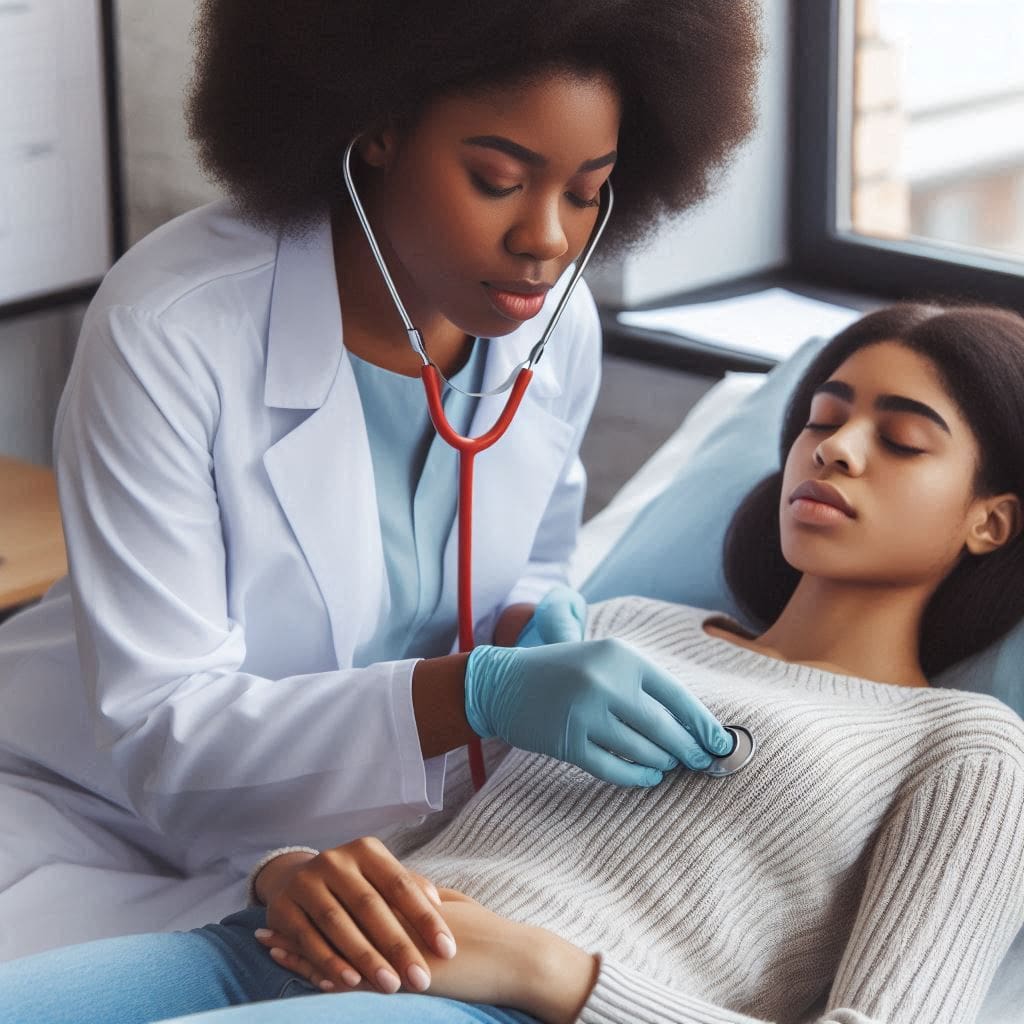Breast cancer is the most common cancer affecting Nigerian women. While it’s often perceived as a disease of older women, a worrying trend shows a rise in cases among younger women (under 40).
This is why it’s important to spread the word about breast cancer, so young Nigerian women can learn how to take care of their breast health.

By educating ourselves and becoming aware of the risks, we can help prevent breast cancer and keep ourselves healthy.
This article dives deep into understanding breast cancer in young women in Nigeria. We’ll explore the reasons behind the increase, risk factors to be aware of, early detection methods, and available treatment options.
Let’s equip ourselves with knowledge and become proactive in protecting our health.
Why is Breast Cancer Increasing in Young Nigerian Women?
There’s no single definitive answer to this complex issue. However, several factors might be contributing:
- Lifestyle Changes: The way we live our lives these days, and adopt Western lifestyles, can increase the risk of breast cancer. This is because we tend to have children later in life and minimally engage in breastfeeding, which can contribute to the development of breast cancer.
- Genetic Predisposition: If someone in your family, especially someone younger, has had breast cancer in the past, you may be at an increased risk of developing the disease too.
- Dense Breast Tissue: In younger women, it’s common to have dense breast tissue. This can make it harder for mammograms to detect lumps effectively.
- Limited Awareness: It is important to know that young women can also develop breast cancer. However, many young women are not aware of the risks and may not take the necessary steps for early detection. This can lead to delays in diagnosis and treatment, which can result in poorer outcomes. Therefore, it is crucial to raise awareness about breast cancer in young women to improve their chances of early detection and better health outcomes.
- Weight Gain: Being overweight or obese is not just a cosmetic concern, it can also increase the risk of cancer, including breast cancer. So, it’s important to maintain a healthy weight to reduce the risk of developing cancer.
Risk Factors of Breast Cancer in Young Women:
Breast cancer is a disease that affects women, and being older puts you at a higher risk. But there are other things that can also increase the risk of breast cancer in young women from Nigeria.
It’s important to know what these things are so that you can take steps to protect yourself.
- Family History: Having a close relative (mother, sister, daughter) diagnosed with breast cancer before age 50 significantly increases your risk.
- Genetic Mutations: Certain changes in genes, such as BRCA1 and BRCA2, can significantly increase the risk of developing certain health conditions. However, through genetic testing, it is possible to assess this risk and take necessary precautions to prevent or manage such conditions.
- Menstrual History: If you start menstruating before the age of 12 or experience menopause after the age of 55, your risk of certain health issues may increase.
- Dense Breast Tissue: As I mentioned before, having dense breast tissue can sometimes make it harder to detect breast cancer early on.
- Dense Breasts and Family History: When a woman has dense breasts and a family history of breast cancer, her risk of developing breast cancer is higher than normal. This can be a cause for concern and may require additional screening or other preventative measures.
- Lifestyle Factors: Eating too many unhealthy fats, not moving your body enough, and drinking too much alcohol can increase your risk chances.
Early Detection is Key
Since breast cancer is more aggressive in young women, early detection is crucial. Here are some methods for self-awareness and early detection:

- Monthly Breast Self-Exams (BSE): Regularly examine your breasts for lumps, changes in size or shape, or nipple discharge. Familiarize yourself with the normal feel of your breasts to identify any abnormalities.
- Clinical Breast Exams (CBE): Schedule regular checkups with your doctor, who will perform a physical examination of your breasts and lymph nodes.
- Mammography: Mammograms are an important test to detect breast cancer early. However, if you are a younger woman with dense breast tissue, mammograms may not be as effective. It’s important to talk to your doctor about your personal risk factors to determine if mammograms are recommended for you. Your doctor can help you understand if you should get a mammogram and when is the best time to do it.
- Ultrasound:Ultrasound is a type of medical test that can be used to check for any possible lumps or abnormalities in the breast tissue. This test can be particularly useful in examining dense breast tissue where it may be more difficult to identify potential issues.
- MRI Scan: If a woman is at a higher risk of getting breast cancer, doctors might suggest getting an MRI scan. MRI is a type of medical test that uses a strong magnet and radio waves to create detailed pictures of the inside of the breast. This test can help detect any potential problems in the breast tissue and can provide an early diagnosis for breast cancer.
Remember: Early detection increases the chances of successful treatment and a positive outcome. Don’t hesitate to talk to your doctor about any concerns you have.
Treatment Options for Breast Cancer in Young Women
The course of treatment for breast cancer depends on various factors like the stage of cancer, tumor type, and your overall health. Here’s an overview of some common treatment options:
- Surgery: Surgery is often the first line of treatment, aiming to remove the cancerous tissue. Depending on the extent of the cancer, this may involve a lumpectomy (removal of the lump only) or a mastectomy (removal of the entire breast).
- Chemotherapy: Chemotherapy uses powerful drugs to kill cancer cells throughout the body. It might be administered before or after surgery depending on the specific case.
- Radiation Therapy: Radiation therapy uses high-energy X-rays to target and destroy cancer cells.
- Hormone Therapy: For hormone receptor-positive breast cancers, hormone therapy medications can help prevent recurrence by blocking the growth of cancer cells that depend on hormones.
- Targeted Therapy: Targeted therapy drugs are a newer approach that targets specific vulnerabilities in cancer cells. These drugs may be particularly beneficial for young women with certain types of breast cancer, such as HER2-positive breast cancer.
Coping with a Breast Cancer Diagnosis
A breast cancer diagnosis can be overwhelming, but you don’t have to face it alone. Here are some resources and support systems available to you:
- Talk to your doctor: Open communication with your doctor is vital. Ask questions, discuss treatment options, and express any concerns you have.
- Join a support group: Connecting with other young women going through a similar experience can be incredibly helpful. Sharing experiences and offering support can create a sense of community and strength.
- Seek emotional support: Counseling or therapy can be a valuable tool in coping with the emotional challenges of a cancer diagnosis. Don’t hesitate to seek professional help for managing stress, anxiety, or depression.
- Focus on self-care: Prioritize your physical and mental well-being. Eat a healthy diet, get regular exercise, and prioritize quality sleep. Relaxation techniques like yoga or meditation can also be helpful.
- Explore online resources: Several credible online resources offer information and support for young women with breast cancer. These platforms can connect you with others, provide educational materials, and empower you throughout your journey.
The Future of Breast Cancer Care in Young Nigerian Women
Medical experts are continually researching and developing new ways to diagnose and treat breast cancer. One exciting advancement is genetic testing, which can help identify women with a high risk of developing the disease, allowing for early interventions and prevention strategies.
Additionally, doctors are working on personalized medicine approaches that are tailored to individual patients, making treatment more effective.
All these advancements bring hope that we will soon be able to better diagnose and treat breast cancer, improving the lives of many women.
Conclusion: Empowerment Through Knowledge
Breast cancer is becoming a more common problem among young women in Nigeria. However, there are ways to increase your chances of detecting it early.
By knowing what might increase your risk, checking yourself regularly for lumps or other changes, and seeing your doctor for regular checkups, you can catch any problems as soon as possible.
Early detection is key to getting the best care and treatment for breast cancer, so it’s important to stay vigilant.
Remember, you are not alone. Numerous resources and support systems are available to help you navigate your breast cancer journey.
Stay informed, prioritize your well-being, and connect with others facing similar challenges. You can face breast cancer with strength and resilience if you equip yourself with knowledge and seek support.
Take Charge of Your Breast Health Today!
Additional Resources:
- Nigerian Cancer Society: https://www.uicc.org/membership/nigerian-cancer-society
- American Cancer Society: https://www.cancer.org/cancer/types/breast-cancer.html
- Susan G. Komen: https://www.komen.org/
Remember: Early detection saves lives. Schedule a regular checkup with your doctor today!



